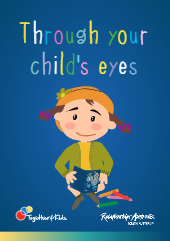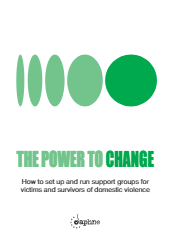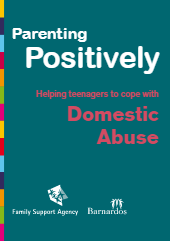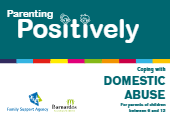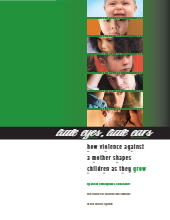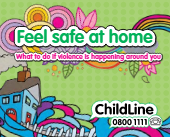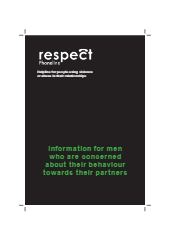Category: Domestic Abuse: Parents
How Do You Want Your Kids to Remember You: A Workbook For Fathers Who Have Harmed Their Partners and Families and Want to Change
“How Do You Want Your Kids to Remember You?A Workbook for Fathers Who Have Harmed Their Partners and Families and Want to Change” is a detailed and transformative guide designed…
Domestic abuse through your child’s eyes: Parenting guide
This resource is a guide for parents who have experienced domestic abuse to help them understand the impacts on their children and how to support them. It emphasizes that even…
How to tell if your abusive partner is changing guide
The “How to Tell If Your Abusive Partner Is Changing Guide” is a comprehensive resource that aims to help individuals in abusive relationships identify signs of genuine change in their…
Domestic Violence: A self help guide for victims
“Domestic Violence: A Self-Help Guide for Victims” is a comprehensive booklet that offers support and guidance to individuals who have experienced domestic abuse. This resource is designed to empower victims…
Programme for victims and survivors of domestic abuse – The Power to Change
The Power to Change booklet is a valuable resource for setting up and running support groups for domestic violence survivors. It covers topics such as facilitator competencies, group development and…
The Teen Relationship Workbook: for professionals helping teens to develop healthy relationships and prevent domestic abuse; 68 worksheets
The Teen Relationship Workbook is a valuable resource designed for professionals working with teenagers to address and prevent relationship abuse. With a collection of 68 worksheets, this workbook can be…
Coping with domestic abuse: Booklet for CHILDREN aged 6 to 12
Coping with domestic abuse: Booklet for CHILDREN aged 6 to 12 is a valuable resource designed to support children and their parents who are experiencing domestic abuse. The booklet aims…
Helping teenagers to cope with Domestic Abuse booklet
“Helping teenagers to cope with Domestic Abuse” booklet aims to provide support and guidance for teenagers and parents dealing with domestic abuse. The booklet covers the following key points: Understanding…
Coping with domestic abuse: Booklet for PARENTS of children between 6 and 12
Coping with domestic abuse: Booklet for PARENTS of children between 6 and 12 is a valuable resource designed to support parents in creating a safe and nurturing environment for their…
Children and Domestic Violence Fact Sheet Series
The Children and Domestic Violence Fact Sheet Series is a comprehensive set of 10 fact sheets specifically created for parents whose children have been impacted by domestic violence. These fact…
Duluth Using Children Post Separation Power and Control Wheel
The ‘Duluth Using Children Post Separation Power and Control Wheel’ from the Domestic Abuse Intervention Programs illustrates tactics used by domestic abuse perpetrators to continue abuse post-separation, with a focus…
Healthy Relationships Workbook (for people with learning difficulties)
The “Healthy Relationship Workbook” is a valuable resource designed to support individuals with intellectual or developmental disabilities in understanding and navigating healthy relationships. This workbook, written in plain English and…
Cycle of Violence Explanation Tool
The Cycle of Violence Explanation Tool is a valuable resource that helps individuals understand the complex dynamics of domestic abuse. This tool provides a clear explanation of the cycle of…
Children’s Domestic Violence Wheel (Tool)
The Children’s Domestic Violence Wheel is a valuable tool used by social workers to illustrate how domestic abuse impacts children. It serves as a visual aid to facilitate conversations with…
Little eyes, little ears: How violence against mother shapes children as they grow (Booklet)
This resource, titled “Little Eyes, Little Ears: How Violence Against a Mother Shapes Children as They Grow,” is a valuable tool for social workers and professionals. It provides essential insights…
Children’s booklet – Feel safe at home: What to do if violence is happening around you
The “Feel Safe at Home: What to Do If Violence Is Happening Around You” children’s booklet is a compact and user-friendly resource specifically designed for children aged seven to twelve…
Domestic Violence Safety Plan (6 pages)
The Domestic Violence Safety Plan (6 pages) is a powerful resource designed to empower women and protect both themselves and their children during incidents of domestic abuse. This comprehensive plan…
Managing jealousy leaflet
This is a 4-page leaflet offering guidance on constructively dealing with jealousy in relationships. It is designed to help people recognise and change controlling or abusive behaviours stemming from jealousy….
Handbook for men concerned about their abusive behaviours towards those they love
This 32-page handbook aims to help men concerned about their abusive behaviours make positive changes in their relationships. It takes an empathetic, non-judgemental approach to spur self-reflection on topics like…
Booklet: Information for men who are concerned about their behaviour towards their female partners
The booklet aims to support men using violence or abuse towards female partners or ex-partners to change their behaviour. It takes a direct yet compassionate approach to spur self-reflection on…
The Power and Control Wheel (The Duluth Model)
The Power and Control Wheel, a crucial tool within the Duluth Model addressing domestic violence dynamics, offers a visual representation of the tactics employed by abusive partners to assert power…
Barnardo’s Domestic Violence Risk Identification Matrix – Assessing the risks to children from male to female domestic violence
Barnardo’s Domestic Violence Risk Identification Matrix – Assessing the risks to children from male to female domestic violence The Barnardo’s Domestic Violence Risk Identification Matrix is a valuable risk assessment…
The Equality Wheel (The Duluth Model)
The Equality Wheel is a visual representation of the qualities necessary for healthy relationships and serves as a guide for individuals who have engaged in abusive behavior to transition towards…

